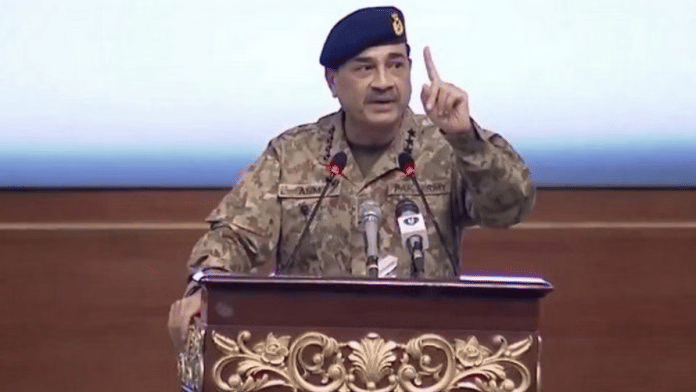New Delhi: Pakistan is heading for another round of constitutional amendments that, according to Lawyers and civil society, is yet another move to entrench the military and give more power to Pakistan’s COAS Field Marshal Asim Munir. Many are calling it ‘the death of justice’.
The proposed amendment to Article 243, which remains officially undisclosed, is said to include provisions that would reshape the judiciary, centralise certain provincial powers, and potentially alter the constitutional framework governing the armed forces.
“If (the amendments) are allowed to go through, what was the worst judicial regression in over 30 years (26th amendment)risks becoming the worst in Pakistan’s history,” Pakistani barrister Asad Rahim Khan wrote in an op-ed for Dawn.
Prime Minister Shehbaz Sharif has spent the past few days in a flurry of meetings with coalition allies, including delegations from the Pakistan Peoples Party (PPP), Muttahida Qaumi Movement–Pakistan (MQM-P), and Pakistan Muslim League–Quaid (PML-Q) in an effort to secure the two-thirds parliamentary majority needed for the 27th Amendment.
Many have questioned the move.
“We ask a simple question: can the Constitution be changed without asking the people it governs? Is Pakistan’s Constitution still a people’s document or a negotiation among powerholders?,” PILDAT, a prominent political think tank wrote on X.
In a video by news portal voicenet.pk, Pakistani lawyers said that this is a move by “an illegitimate government to completely do away with any constitutionality and hand over power to the country’s ‘military establishment’.”
Also read: Indians want to know how Munir got as tall as Trump. ‘Next-level obsession,’ Pakistanis say
What is new this time?
PPP chairperson Bilawal Bhutto-Zardari, in a post on X, said the government had requested his party’s backing for a package that includes the creation of provincial constitutional courts, the restoration of executive magistrates, and new rules governing the transfer of judges.
The draft also proposes removing the constitutional protection of provincial shares under the National Finance Commission (NFC) Award and revising Article 243, which defines the command structure of the armed forces.
The PPP called an emergency meeting of its Central Executive Committee Thursday to finalise its stance. “The proposal touches on several issues settled under the 18th Amendment,” Bhutto-Zardari warned, referencing the landmark 2010 reform that devolved sweeping powers to Pakistan’s provinces.
According to Dawn, party insiders say the PPP remains divided, wary of appearing complicit in a move that could be seen as reversing that devolution.
The MQM-P, meanwhile, has tied its support to guarantees for local government autonomy.
Officials have dismissed speculation that the 27th Amendment would undermine provincial powers or judicial independence. Defence Minister Khawaja Asif said consultations were still underway, emphasizing that “no step will be taken that weakens the federation or the provinces.”
The opposition Pakistan Tehreek-e-Insaf (PTI) has vowed to resist the proposal “tooth and nail.” Party chairman Barrister Gohar Ali Khan warned that the amendment would “jeopardise the independence of the judiciary” and threaten the integrity of the federation.
Minister for Parliamentary Affairs Tariq Fazal Chaudhry accused opponents of spreading “false propaganda,” asserting that the reforms aim to improve governance, bolster defence, and strengthen federal-provincial relations. The government, he said, intends to “uphold the spirit of the Constitution.”
With 233 seats in the 336-member National Assembly, the ruling coalition technically holds enough votes to clear the lower house. But in the 96-member Senate, it falls short of the two-thirds majority required—61 seats against the 64 needed—leaving the government reliant on smaller parties or opposition defections.
Experts say, it is a facade to entrench the supremacy of military rule in the country. One expert told The Express Tribune that, “debates over judicial independence are now largely irrelevant, especially since the 26th Amendment” and that “the judiciary’s role is now to act as a rubber stamp, providing legal cover for the executive branch’s efforts to organise and consolidate power”.
“What we need to ask instead is: how does the current regime seek to use and weaponise the judiciary and how does this amendment serve that purpose,” he was quoted saying.
Also read: Pakistanis want Maryam Nawaz to arrest husband. A 2017 anti-Ahmadi speech has surfaced
An officially military run country
“At the heart of Pakistan’s constitutional storm lies Article 243 the clause that keeps the military under civilian command. The 27th Amendment seeks to sever that chain. Give Asim the final word on where Pakistan’s troops go,” an X user wrote.
Pakistani journalist Zarrar Khuhro wrote on X that Article 243 has been amended five times in Pakistan’s history. Going into the nuances and a history lesson, he labelled it “the ongoing struggle for control between the country’s civilian and military power centers.”
He then pointed out that the original 1973 Constitution stated that “the Federal Government shall have control and command of the Armed Forces.” General Zia-ul-Haq later amended it to read that “the Supreme Command of the Armed Forces shall vest in the President,” effectively shifting authority from the civilian government to the presidency and, by extension, the military.
In 1997, then-Prime Minister Nawaz Sharif rolled back that change by deleting the words “in his (President’s) discretion,” restoring control of the armed forces to the federal government and parliament.
General Pervez Musharraf reversed course once again in 2002 through the Legal Framework Order (LFO), restoring presidential dominance. The pendulum swung back under the 18th Amendment in 2010, which symbolically retained the president’s role as commander-in-chief but vested actual authority in the federal government— an arrangement that remains in place even today.
As Khuhro put it, “It’s been push and pull. And now, it’s pull time.”
(Edited by Theres Sudeep)






